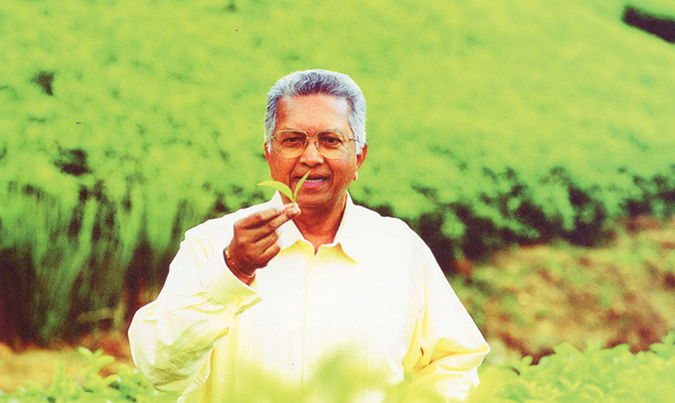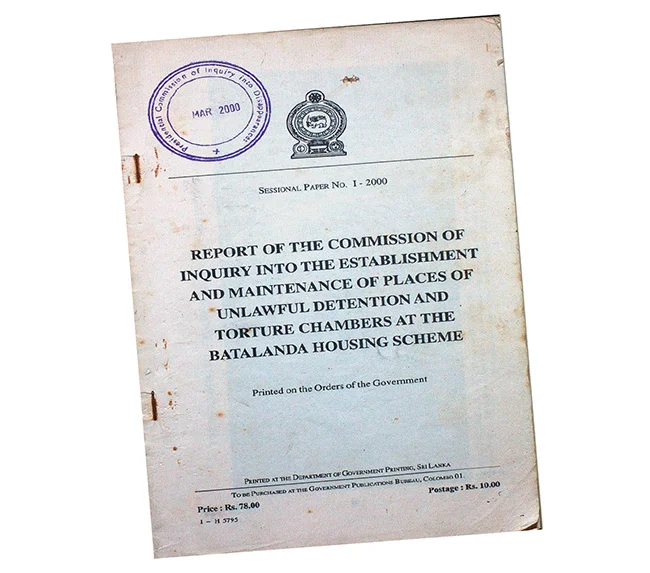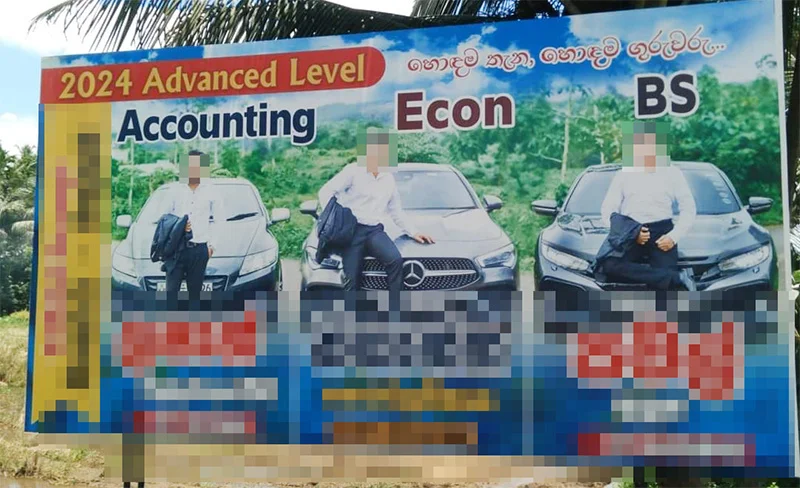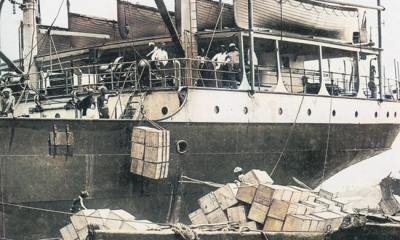Features
Interesting interludes while on State business in Europe and Taiwan & attempting to enter S’pore

(Excerpted from the Merrill Fernando autobiography)
Infrequently, my preoccupation with my personal business was disrupted by unexpected but welcome interruptions, in the form of foreign travel opportunities on behalf of the Government. Once, then Secretary of Trade Ivan Samarawickrema, asked me whether I would travel to Europe as a delegate from Sri Lanka, to a conference on the European Common Market, hosted by the Dutch Government. I immediately agreed as I felt that it would be a useful opportunity, both as an educational exercise and as a possible opening for the development of new business.
During the trip, six of us from Sri Lanka, along with the other delegates from about 50 countries, took part in a boat excursion along the Rhine, starting from Holland and travelling through France, Austria, and Germany, back to Holland. Learning about the proposed scope and objectives of the European Common Market was very useful from a business point of view.
On the final night of the cruise, after the celebratory dinner, conference rapporteur Dr. J. Rijpma of Leiden University, invited me to propose a vote of thanks on behalf of the visiting delegates. It eventually turned out to be a riotous night, with some of the highly-lubricated delegates getting together much later, placing me on a blanket, and holding me out of the ship over the fast-flowing water of the Rhine! The blanket held despite my size and weight and I was hauled back safely on board.
In 1965, the UN had written to the Ceylon Chamber of Commerce, seeking the services of a tea specialist with knowledge of plantations, tea manufacture, and tea marketing, to advise the Taiwanese Government. Conrad Dias, then Secretary of the Chamber, contacted me and asked whether I could stay away from my business for a couple of months as, in his flattering view, there was no person better qualified for the assignment!
I agreed immediately as I looked upon the task as another invaluable learning experience for me personally, quite apart from the service I would render to both our Chamber and the Taiwanese Government. For the assignment I was paired with Alistair Williamson, a senior tea planter from the Uva District and, at that time, the Superintendent of Rookatenne Estate, Hali Ela, a large tea plantation in the Harrisons Agency.
The two of us traveled in Taiwan together, visiting tea plantations and factories, and were able to offer the industry there some useful and practical advice, some of which were implemented to their immediate benefit. Taiwan was best known then for the high quality ‘Oolong’ grades it used to manufacture. As for Black Tea, its general manufacturing policy was to make a largely-generic grade right across all plantations and then segregate it, depending on actual buyer requirements.
We showed them how to manufacture a Ceylon type Black Tea. I offered a sample to my customers in UK and they responded with a quote of 32 pence per pound, a very decent price then. However, the Taiwan Joint Commission on Rural Reconstruction (JCRR), a State organ with wide-ranging authority over agricultural and plantation development in Taiwan, which was also monitoring our assignment, preferred to handle it on their own and retained the sample for themselves.
I was paid USD 2,000 for the trip and on my return journey, stopping off in Hong Kong, I bought a second-hand Ford Zodiac with the money and shipped it across to Sri Lanka. It gave me two years of very good service till I sold it.
Singapore Trading Center
Over the decades of my trading activities all over the world, I had developed many useful contacts, associates, and trading partners. Many of them also became my friends. Bill Bennet, who originally trained as a tea taster and blender at Heath and Co, Colombo, was one such. Returning to Australia later, he worked with his father in his family company, H. A. Bennet & Sons. The others were Mike Robinson and Leon van Leur in South Africa, Alex Supit in Indonesia, and Richard Marc of India.
I discussed with this group an idea I had for a long time, to set up a tea trading and supply center in Singapore. We were all in agreement that it was a concept with great potInteresting interludes while on State business in Europe and Taiwan & attempting to enter S’poreential. Our company, incorporated in 1979, was called ‘TECOF’.
Unfortunately, Ganendra Balasingham, the man we chose as the Operational Head was, in actual fact, quite unsuitable for the job. He was unable to make a success of it and about four years later we had to terminate the operation, by which time he had lost quite a bit of our money, including USD 25,000 from the business that I asked him to bank on my behalf. Subsequently, since he was unemployed, I recommended him to Heath & Co, which was then owned by my friend Ronnie de Mel’s daughter and son-in-law. Unsurprisingly, he was compelled to soon move out of that company as well.
Together, Bill Bennet, Alex Supit and his partner Don Zakir in Indonesia, and Leon van Leur did an excellent job of selling tea to the major blenders and packers of the two brands Joko’ and ‘Five Roses’. Though we lost money from the Singapore operation, we remained very good friends.
Business in Singapore – a second attempt
About 20 years ago, on a visit to Australia, I met an interesting man at the Crowne Plaza, Melbourne; Nasir S. Bamadhaj was a man of Indonesian origin, according to himself a confidante of General Suharto, then Prime Minister of Indonesia. He was a businessman, clearly with wide-ranging contacts in all aspects of trade in Singapore and South East Asia. He gave me a proposal for a Joint Venture company, for the distribution of Dilmah tea in Singapore initially and, later, for him to be an importer/distributor with exclusive rights to Dilmah.
However, as time progressed, we realized that whilst Nasir had excellent contacts in Singapore and was able to get Dilmah listed with all the main retailers in Singapore, despite his persuasive rhetoric, he had no experience in managing a marketing operation.
To cut a long story short, I eventually decided to withdraw from our engagement with Bamadhaj, as I realized that he was running in to financial difficulties, although I had assisted him several times. At that point he filed action against us in Singapore. Fortunately, when the matter came up for trial, we were able to disprove his allegations, as all the communications between us had been carefully archived by my office and were submitted to Court during the trial.
There was indisputable documentary proof of our bona fides in the matter. The presiding judge, having gone through the evidence, took special pains to point out to Bamadhaj how helpful we had been to him and ruled in our favour. I did not claim damages from him though, as, having vindicated my position, I saw no purpose in hurting the man.
Potential Business in China
In 2015, following a visit to Sri Lanka by a senior Chinese official to purchase Ceylon Tea, I was invited to China to discuss the possibility of a Joint Venture with a Chinese corporation.The interested party was Hunan Tea Group Company Ltd. of Changsha, Hunan. Responding to the invitation, I visited Beijing where I met several senior Government officers. They submitted a plan for a Joint Venture in any tea-growing province in China.
Once the initial discussions in Beijing were concluded, they assigned to me an official who accompanied me to Canton, where I had discussions with the chairman of the corporation. However, I was not convinced of the accuracy of the industry information given to me about their operation in Hunan, especially worker wages and related statistics, which seemed to me to be highly exaggerated, I got the clear impression that those responsible for the operation in the province would not welcome an outsider in to their territory.
The official who accompanied me understood the situation and, on our return from Canton, he conveyed his views to his seniors in Beijing. Subsequently I was invited to revisit as they obviously wanted to pursue the matter but I declined courteously.
Features
Inescapable need to deal with the past

The sudden reemergence of two major incidents from the past, that had become peripheral to the concerns of people today, has jolted the national polity and come to its centre stage. These are the interview by former president Ranil Wickremesinghe with the Al Jazeera television station that elicited the Batalanda issue and now the sanctioning of three former military commanders of the Sri Lankan armed forces and an LTTE commander, who switched sides and joined the government. The key lesson that these two incidents give is that allegations of mass crimes, whether they arise nationally or internationally, have to be dealt with at some time or the other. If they are not, they continue to fester beneath the surface until they rise again in a most unexpected way and when they may be more difficult to deal with.
In the case of the Batalanda interrogation site, the sudden reemergence of issues that seemed buried in the past has given rise to conjecture. The Batalanda issue, which goes back 37 years, was never totally off the radar. But after the last of the commission reports of the JVP period had been published over two decades ago, this matter was no longer at the forefront of public consciousness. Most of those in the younger generations who were too young to know what happened at that time, or born afterwards, would scarcely have any idea of what happened at Batalanda. But once the issue of human rights violations surfaced on Al Jazeera television they have come to occupy centre stage. From the day the former president gave his fateful interview there are commentaries on it both in the mainstream media and on social media.
There seems to be a sustained effort to keep the issue alive. The issues of Batalanda provide good fodder to politicians who are campaigning for election at the forthcoming Local Government elections on May 6. It is notable that the publicity on what transpired at Batalanda provides a way in which the outcome of the forthcoming local government elections in the worst affected parts of the country may be swayed. The problem is that the main contesting political parties are liable to be accused of participation in the JVP insurrection or its suppression or both. This may account for the widening of the scope of the allegations to include other sites such as Matale.
POLITICAL IMPERATIVES
The emergence at this time of the human rights violations and war crimes that took place during the LTTE war have their own political reasons, though these are external. The pursuit of truth and accountability must be universal and free from political motivations. Justice cannot be applied selectively. While human rights violations and war crimes call for universal standards that are applicable to all including those being committed at this time in Gaza and Ukraine, political imperatives influence what is surfaced. The sanctioning of the four military commanders by the UK government has been justified by the UK government minister concerned as being the fulfilment of an election pledge that he had made to his constituents. It is notable that the countries at the forefront of justice for Sri Lanka have large Tamil Diasporas that act as vote banks. It usually takes long time to prosecute human rights violations internationally whether it be in South America or East Timor and diasporas have the staying power and resources to keep going on.
In its response to the sanctions placed on the military commanders, the government’s position is that such unilateral decisions by foreign government are not helpful and complicate the task of national reconciliation. It has faced criticism for its restrained response, with some expecting a more forceful rebuttal against the international community. However, the NPP government is not the first to have had to face such problems. The sanctioning of military commanders and even of former presidents has taken place during the periods of previous governments. One of the former commanders who has been sanctioned by the UK government at this time was also sanctioned by the US government in 2020. This was followed by the Canadian government which sanctioned two former presidents in 2023. Neither of the two governments in power at that time took visibly stronger stands.
In addition, resolutions on Sri Lanka have been a regular occurrence and have been passed over the Sri Lankan government’s opposition since 2012. Apart from the very first vote that took place in 2009 when the government promised to take necessary action to deal with the human rights violations of the past, and won that vote, the government has lost every succeeding vote with the margins of defeat becoming bigger and bigger. This process has now culminated in an evidence gathering unit being set up in Geneva to collect evidence of human rights violations in Sri Lanka that is on offer to international governments to use. This is not a safe situation for Sri Lankan leaders to be in as they can be taken before international courts in foreign countries. It is important for Sri Lanka’s sovereignty and dignity as a country that this trend comes to an end.
COMPREHENSIVE SOLUTION
A peaceful future for Sri Lanka requires a multi-dimensional approach that addresses the root causes of conflict while fostering reconciliation, justice, and inclusive development. So far the government’s response to the international pressures is to indicate that it will strengthen the internal mechanisms already in place like the Office on Missing Persons and in addition to set up a truth and reconciliation commission. The difficulty that the government will face is to obtain a national consensus behind this truth and reconciliation commission. Tamil parties and victims’ groups in particular have voiced scepticism about the value of this mechanism. They have seen commissions come and commissions go. Sinhalese nationalist parties are also highly critical of the need for such commissions. As the Nawaz Commission appointed to identify the recommendations of previous commissions observed, “Our island nation has had a surfeit of commissions. Many witnesses who testified before this commission narrated their disappointment of going before previous commissions and achieving nothing in return.”
Former minister Prof G L Peiris has written a detailed critique of the proposed truth and reconciliation law that the previous government prepared but did not present to parliament.
In his critique, Prof Peiris had drawn from the South African truth and reconciliation commission which is the best known and most thoroughly implemented one in the world. He points out that the South African commission had a mandate to cover the entire country and not only some parts of it like the Sri Lankan law proposes. The need for a Sri Lankan truth and reconciliation commission to cover the entire country and not only the north and east is clear in the reemergence of the Batalanda issue. Serious human rights violations have occurred in all parts of the country, and to those from all ethnic and religious communities, and not only in the north and east.
Dealing with the past can only be successful in the context of a “system change” in which there is mutual agreement about the future. The longer this is delayed, the more scepticism will grow among victims and the broader public about the government’s commitment to a solution. The important feature of the South African commission was that it was part of a larger political process aimed to build national consensus through a long and strenuous process of consultations. The ultimate goal of the South African reconciliation process was a comprehensive political settlement that included power-sharing between racial groups and accountability measures that facilitated healing for all sides. If Sri Lanka is to achieve genuine reconciliation, it is necessary to learn from these experiences and take decisive steps to address past injustices in a manner that fosters lasting national unity. A peaceful Sri Lanka is possible if the government, opposition and people commit to truth, justice and inclusivity.
by Jehan Perera
Features
Unleashing Minds: From oppression to liberation

 Education should be genuinely ‘free’—not just in the sense of being free from privatisation, but also in a way that empowers students by freeing them from oppressive structures. It should provide them with the knowledge and tools necessary to think critically, question the status quo, and ultimately liberate themselves from oppressive systems.
Education should be genuinely ‘free’—not just in the sense of being free from privatisation, but also in a way that empowers students by freeing them from oppressive structures. It should provide them with the knowledge and tools necessary to think critically, question the status quo, and ultimately liberate themselves from oppressive systems.
Education as an oppressive structure
Education should empower students to think critically, challenge oppression, and envision a more just and equal world. However, in its current state, education often operates as a mechanism of oppression rather than liberation. Instead of fostering independent thinking and change, the education system tends to reinforce the existing power dynamics and social hierarchies. It often upholds the status quo by teaching conformity and compliance rather than critical inquiry and transformation. This results in the reproduction of various inequalities, including economic, racial, and social disparities, further entrenching divisions within society. As a result, instead of being a force for personal and societal empowerment, education inadvertently perpetuates the very systems that contribute to injustice and inequality.
Education sustaining the class structure
Due to the widespread privatisation of education, the system continues to reinforce and sustain existing class structures. Private tuition centres, private schools, and institutions offering degree programmes for a fee all play a significant role in deepening the disparities between different social classes. These private entities often cater to the more affluent segments of society, granting them access to superior education and resources. In contrast, students from less privileged backgrounds are left with fewer opportunities and limited access to quality education, exacerbating the divide between the wealthy and the underprivileged. This growing gap in educational access not only limits social mobility but also perpetuates a cycle where the privileged continue to secure better opportunities while the less fortunate struggle to break free from the constraints of their socio-economic status.
Gender Oppression
Education subtly perpetuates gender oppression in society by reinforcing stereotypes, promoting gender insensitivity, and failing to create a gender-sensitive education system. And some of the policymakers do perpetuate this gender insensitive education by misinforming people. In a recent press conference, one of the former members of Parliament, Wimal Weerawansa, accused gender studies of spreading a ‘disease’ among students. In the year 2025, we are still hearing such absurdities discouraging gender studies. It is troubling and perplexing to hear such outdated and regressive views being voiced by public figures, particularly at a time when societies, worldwide, are increasingly embracing diversity and inclusion. These comments not only undermine the importance of gender studies as an academic field but also reinforce harmful stereotypes that marginalise individuals who do not fit into traditional gender roles. As we move forward in an era of greater social progress, such antiquated views only serve to hinder the ongoing work of fostering equality and understanding for all people, regardless of gender identity.
Students, whether in schools or universities, are often immersed in an educational discourse where gender is treated as something external, rather than an essential aspect of their everyday lives. In this framework, gender is framed as a concern primarily for “non-males,” which marginalises the broader societal impact of gender issues. This perspective fails to recognise that gender dynamics affect everyone, regardless of their gender identity, and that understanding and addressing gender inequality is crucial for all individuals in society.
A poignant example of this issue can be seen in the recent troubling case of sexual abuse involving a medical doctor. The public discussion surrounding the incident, particularly the media’s decision to disclose the victim’s confidential statement, is deeply concerning. This lack of respect for privacy and sensitivity highlights the pervasive disregard for gender issues in society.
What makes this situation even more alarming is that such media behaviour is not an isolated incident, but rather reflects a broader pattern in a society where gender sensitivity is often dismissed or ignored. In many circles, advocating for gender equality and sensitivity is stigmatised, and is even seen as a ‘disease’ or a disruptive force to the status quo. This attitude contributes to a culture where harmful gender stereotypes persist, and where important conversations about gender equity are sidelined or distorted. Ultimately, this reflects the deeper societal need for an education system that is more attuned to gender sensitivity, recognising its critical role in shaping the world students will inherit and navigate.
To break free from these gender hierarchies there should be, among other things, a gender sensitive education system, which does not limit gender studies to a semester or a mere subject.
Ragging
The inequality that persists in class and regional power structures (Colombo and non-Colombo division) creeps into universities. While ragging is popularly seen as an act of integrating freshers into the system, its roots lie in the deeply divided class and ethno-religious divisions within society.
In certain faculties, senior students may ask junior female students to wear certain fabrics typically worn at home (cheetta dresses) and braid their hair into two plaits, while male students are required to wear white, long-sleeved shirts without belts. Both men and women must wear bathroom slippers. These actions are framed as efforts to make everyone equal, free from class divisions. However, these gendered and ethicised practices stem from unequal and oppressive class structures in society and are gradually infiltrating university culture as mechanisms of oppression.The inequality that persists in gradually makes its way into academic institutions, particularly universities.
These practices are ostensibly intended to create a sense of uniformity and equality among students, removing visible markers of class distinction. However, what is overlooked is that these actions stem from deeply ingrained and unequal social structures that are inherently oppressive. Instead of fostering equality, they reinforce a system where hierarchical power dynamics in the society—rooted in class, gender, and region—are confronted with oppression and violence which is embedded in ragging, creating another system of oppression.
Uncritical Students
In Sri Lanka, and in many other countries across the region, it is common for university students to address their lecturers as ‘Sir’ and ‘Madam.’ This practice is not just a matter of politeness, but rather a reflection of deeply ingrained societal norms that date back to the feudal and colonial eras. The use of these titles reinforces a hierarchical structure within the educational system, where authority is unquestioned, and students are expected to show deference to their professors.
Historically, during colonial rule, the education system was structured around European models, which often emphasised rigid social distinctions and the authority of those in power. The titles ‘Sir’ and ‘Madam’ served to uphold this structure, positioning lecturers as figures of authority who were to be respected and rarely challenged. Even after the end of colonial rule, these practices continued to permeate the education system, becoming normalised as part of the culture.
This practice perpetuates a culture of obedience and respect for authority that discourages critical thinking and active questioning. In this context, students are conditioned to see their lecturers as figures of unquestionable authority, discouraging dialogue, dissent, or challenging the status quo. This hierarchical dynamic can limit intellectual growth and discourage students from engaging in open, critical discussions that could lead to progressive change within both academia and society at large.
Unleashing minds
The transformation of these structures lies in the hands of multiple parties, including academics, students, society, and policymakers. Policymakers must create and enforce policies that discourage the privatisation of education, ensure equal access for all students, regardless of class dynamics, gender, etc. Education should be regarded as a fundamental right, not a privilege available only to a select few. Such policies should also actively promote gender equality and inclusivity, addressing the barriers that prevent women, LGBTQ+ individuals, and other marginalised genders from accessing and succeeding in education. Practices that perpetuate gender inequality, such as sexism, discrimination, or gender-based violence, need to be addressed head-on. Institutions must prioritise gender studies and sensitivity training to cultivate an environment of respect and understanding, where all students, regardless of gender, feel safe and valued.
At the same time, the micro-ecosystems of hierarchy within institutions—such as maintaining outdated power structures and social divisions—must be thoroughly examined and challenged. Universities must foster environments where critical thinking, mutual respect, and inclusivity—across both class and gender—are prioritised. By creating spaces where all minds can flourish, free from the constraints of entrenched hierarchies, we can build a more equitable and intellectually vibrant educational system—one that truly unleashes the potential of all students, regardless of their social background.
(Anushka Kahandagamage is the General Secretary of the Colombo Institute for Human Sciences)
Kuppi is a politics and pedagogy happening on the margins of the lecture hall that parodies, subverts, and simultaneously reaffirms social hierarchies.
By Anushka Kahandagamage
Features
New vision for bassist Benjy

It’s a known fact that whenever bassist Benjy Ranabahu booms into action he literally lights up the stage, and the exciting news I have for music lovers, this week, is that Benjy is coming up with a new vision.
One thought that this exciting bassist may give the music scene a layoff, after his return from the Seychelles early this year.
At that point in time, he indicated to us that he hasn’t quit the music scene, but that he would like to take a break from the showbiz setup.
“I’m taking things easy at the moment…just need to relax and then decide what my future plans would be,” he said.
However, the good news is that Benjy’s future plans would materialise sooner than one thought.
Yes, Benjy is putting together his own band, with a vision to give music lovers something different, something dynamic.
He has already got the lineup to do the needful, he says, and the guys are now working on their repertoire.
The five-piece lineup will include lead, rhythm, bass, keyboards and drums and the plus factor, said Benjy, is that they all sing.
A female vocalist has also been added to this setup, said Benjy.
“She is relatively new to the scene, but with a trained voice, and that means we have something new to offer music lovers.”
The setup met last week and had a frank discussion on how they intend taking on the music scene and everyone seems excited to get on stage and do the needful, Benjy added.
Benjy went on to say that they are now spending their time rehearsing as they are very keen to gel as a team, because their skills and personalities fit together well.
“The guys I’ve got are all extremely talented and skillful in their profession and they have been around for quite a while, performing as professionals, both here and abroad.”
Benjy himself has performed with several top bands in the past and also had his own band – Aquarius.
Aquarius had quite a few foreign contracts, as well, performing in Europe and in the Middle East, and Benjy is now ready to do it again!
-

 Sports3 days ago
Sports3 days agoSri Lanka’s eternal search for the elusive all-rounder
-

 Features7 days ago
Features7 days agoCelebrating 25 Years of Excellence: The Silver Jubilee of SLIIT – PART I
-

 Business7 days ago
Business7 days agoCEB calls for proposals to develop two 50MW wind farm facilities in Mullikulam
-

 News4 days ago
News4 days agoGnanasara Thera urged to reveal masterminds behind Easter Sunday terror attacks
-

 Business5 days ago
Business5 days agoAIA Higher Education Scholarships Programme celebrating 30-year journey
-

 Features7 days ago
Features7 days agoNotes from AKD’s Textbook
-

 News3 days ago
News3 days agoComBank crowned Global Finance Best SME Bank in Sri Lanka for 3rd successive year
-

 News2 days ago
News2 days agoBid to include genocide allegation against Sri Lanka in Canada’s school curriculum thwarted















